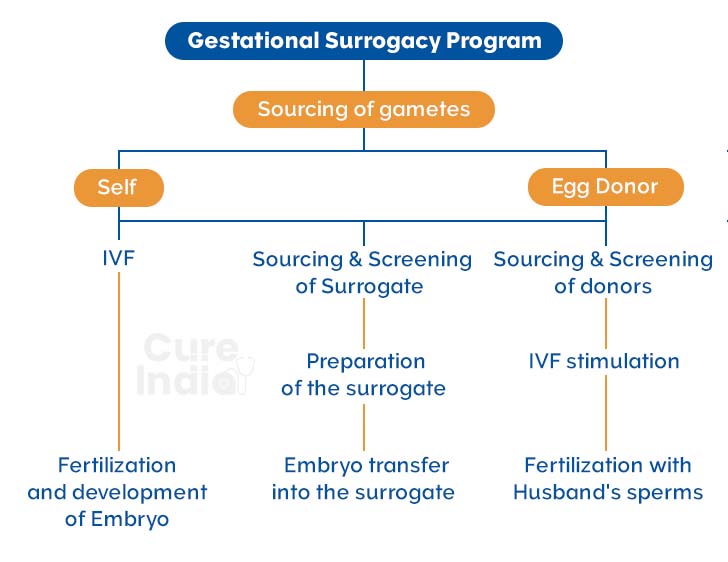

Are you willing to have your biological baby but are unable to?
For the mothers who cannot carry their baby for themselves, surrogacy is the best option for them. In India, couples are allowed to opt for ivf surrogacy only when natural and assisted conception means rule out.
With the process of in vitro fertilization, a lot of parents are blessed with a child or even twins. The process makes it possible to extract eggs from the female & sperm from the males and fertilize under suitable conditions in the laboratory. Later, the healthy foetus is planted in the female for later development. In the case of surrogacy, the foetus is planted back into the uterus of other women, also called a surrogate mother. The surrogate then carries the baby until birth.

There are two types of surrogate mothers:
In this type, the surrogate is artificially inseminated by father’s sperm.She then carries the baby until birth and later on you and your partner will raise it.This is a traditional method of surrogacy and the surrogate is the biological mother of the baby. This is because the egg of the surrogate was fertilized with the father’s sperm.
Because of surrogate mother being the biological mother of the baby, traditional surrogacy mother was not opted by a lot of couples. They wanted to have a baby of their own and so, with the advancement in technology now, it is possible to extract eggs from the mother and sperm from the father. The gametes are fertilized by a technique called in-vitro fertilization. After fertilization, the embryo is placed into the uterus of the gestational surrogate.
The surrogate mother then carries the baby until birth and would be its birth mother. Because the wasn’t of the surrogate that was used during fertilization, the surrogate would not have any genetic ties to the baby.
In India, gestational surrogacy is more common because the parents would have the genetic ties to the child. Unlike the traditional surrogacy in which the surrogate was the biological mother of the child.

There are two types of surrogacy arrangements:
In this time of arrangement the surrogate is paid for carrying the child. Commercial surrogacy is not permitted in India, Australia, New Zealand etc.

In this type of arrangement, the surrogate is given no financial gain for carrying the child. The intended parents bear the realistic out of pocket expenses of the surrogate like medical costs, travel, time off work, etc. Altruistic Surrogacy can use either traditional or gestational surrogate and is permitted in India.
In India, commercial surrogacy was grown into a multi-million industry. Therefore, commercial surrogacy has been made illegal in India. However, surrogacy is allowed:
.jpg)
CureIndia helps you choose the right doctor for your medical treatment. Most of the doctors in our associated hospitals have been internationally trained and are active members of many international medical councils and associations. Let's hear from some of the most reputed doctor's for the treatment of infertility in women in India.
Dr. Shivani Sachdev Gour is an MBBS, MD – Obstetrics & Gynecology, DNB – Medical Genetics. She is a renowned Gynecologist, Obstetrician and Fertility Specialist that has 17 years of experience in this profession and has treated thousands of couples. Dr. Gour has completed her medical & Obstetrical qualifications from Mumbai in the year 2000 and to add in her accolades, she was also involved in the treatment of the first cases of legal surrogacy in India
Dr Aastha Gupta is an obstetrician, gynaecologist, fertility doctor and IVF consultant, associated with Delhi IVF and Fertility Research Centre. The clinic treats infertility in both men and women using the procedures such as IUI, IVF, IVF- Egg donation, surrogacy, endoscopy (Hysteroscopy / Laparoscopy), stem cell therapy, and associated therapies. She has performed more than 5000 ova pick up procedure & has also assisted more than 4200 fertility-enhancing endoscopy procedures. As a fertility doctor, she has also contributed to many studies in the research centre like repeated implant failure, the role of G-CSF in poor endometrial lining & response, the role of adjuvant therapies like prophylactic curettage etc
Dr. Gauri Agarwal is a leading fertility specialist and surrogacy doctor in Delhi/NCR. Backed by visionary thinking, die-hard determination and industry rich experience of more than 10 years. She followed this with a hard-earned fellowship program in reproductive medicine (Infertility) from University of Fent, Belgium and further received training in embryology at Natinal university of Singapore.


According to the guidelines issued by ICMR, couples are allowed to opt for surrogacy if the natural & medical conditions rule out for conception. Some of the medical conditions are as follows:
While opting for surrogacy, you have to take care of the surrogate mother and should bear the cost of procedures to impregnate her. Therefore, you would have to cover the cost for the following:
If you are unable to conceive through both natural and medical conception and you want to have your biological baby, surrogacy is the best option for you.Thinking and opting for surrogacy can be an emotional coaster ride for you, your family & friends. A lot of complex issues are involved in it and you have to consider a lot of things before you go for it. However, for some couples it is a very straightforward decision. To help you out in making the right decision for you, CureIndia will help you consult an infertility specialist or counsellor. They will help you in seeing things with the right perspective and will suggest to you other options like adoption or further infertility treatments.
Surrogacy procedure in India, would be based on your state laws, surrogacy professional and individual circumstances. It may vary from case to case, so the following step-by-step will help you prepare for your surrogacy journey.
The first step of surrogacy is to consider whether surrogacy is right for you or not. Becoming a surrogate mother or parent through surrogacy can be a long and emotional journey which requires commitment from both the parties. Surrogacy is just like any other major decision for couples or individuals considering surrogacy. While going for surrogacy procedure, you should carefully consider surrogacy laws, its pros and cons, and even speak with various professionals like counsellor, infertility specialist etc.
Once the intended parents or surrogate has decided and committed to surrogacy, they must determine the needs and goals. Also, they should choose the type of surrogacy they want to go for.
First, there are two types of surrogacy procedures:
Traditional- In traditional surrogacy, the surrogate is the biological mother of the child. While carrying out traditional surrogacy, the sperm of the intended father is inseminated into the surrogate. This procedure is also called Intrauterine insemination (IUI).
Gestational- In gestational surrogacy, the child is not biologically related to the surrogate. Instead, it is biologically related to the intended parents. In this case, conception is done by in-vitro fertilization. Once the egg is fertilized in the laboratory, the embryo is transferred to the surrogate. This is also called IVF surrogacy.
After choosing the surrogacy procedure you should proceed considering the following:
Whether you need donor sperm or eggs?
Whether you know a surrogate or will need matching services?
Your goals for surrogacy?
Your infertility specialist would help you out in finding the answers to your questions and help you out with this journey. From finding the surrogate to your delivery and postnatal care, your doctor would help you out. You just have to choose the correct doctor for you and your journey would be much easier than it looks. CureIndia would help you find out the best specialist as per your needs and would make sure that you have a happy parenthood.
One of the most important steps of surrogacy is choosing the right surrogate for you. You may need to work with your infertility specialist to find the right surrogate mother for you. According to the guidelines of ICMR, in India the guidelines for choosing a surrogate are very meticulous and stringent. The surrogate must be:
.jpg)
Once the contracts have been signed by both the parties, the medical procedure for surrogacy will start. In case of traditional surrogacy, the semen will be injected into the surrogate for conception. But in case of gestational surrogacy, the intended mother or the egg donor will be given medication to help her develop eggs. The developed eggs would be retrieved and fertilized in the laboratory. This process is also called in vitro fertilization. The fertilized eggs would then be transferred to the surrogate. The surrogate will undergo fertility treatments before embryo transfer and during pregnancy during ivf surrogacy.
After the long surrogacy process and the wait of nine months, the birth of the baby is life changing for both the parents and surrogate. After checking the condition of the surrogate and the child, both are discharged from the hospital. The intended parents have their baby and the surrogate has the satisfaction of giving a gift of parenthood.

In the case of fresh embryos, the success rate of surrogacy is 45%. Whereas for frozen embryos it is about 25%. Low surrogacy cost and high success rates are the highlights of surrogacy in India.
No, it isn't, and the same applies to gay surrogacy. According to the law, only married heterosexual couples have the right to have a baby via surrogacy.
Surrogacy is the best option for the couples that are willing to have their biological child but unable to. In India, surrogacy is legal for the couples who are unable to conceive through natural or medical conception. The genetic mother can bond with the child better than in situations like adoption.
It totally depends on the type of surrogacy you’ll opt for. If you opt for traditional surrogacy, the child will look like the surrogate. If you’ll opt for gestational surrogacy, the child would look like the sperm and egg donor i.e. the intendended couples.
In 2002, surrogacy was allowed for the medical tourists but is no longer available from 2015.
Surrogacy in India is done by an infertility specialist in an authorised infertility clinic or surrogacy centre. The procedure is done by following the legal requirements and would cost you around 15-20 lakhs.

IVF/IUI/ICSI
Best IVF packages
Be proud parents
Consult Infertility Specialists
Thousands of successful IVF deliveries
Consult top IVF Clinics